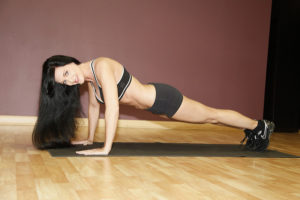
Idealised images of fitness and exercise promote the idea that girls simply need to work hard to achieve the same beauty goals (Image credit: Keith Allison)
This guest blog is by Milly Morris, a PhD researcher at Birmingham University, who is currently examining the relationship between the dieting industry, the ‘obesity crisis’ and idealistic standards of female beauty in the northern hemisphere. Writing for Girl Museum, Milly discusses the impact that unachievable fitness images on Instagram may have on young women and their body image.
In a world where we document our lives through social media, Instagram’s sole purpose is to take our mundane everyday occurrences and turn them into a work of art. The ability to crop our social circle, our work life and even our breakfast into a neat little square and lace in a bohemian glow has caused the website to be extremely popular amongst young women. Anyone who has Instagram will recognise the images that are central to its ‚Äúhealth and fitness‚Äù trend: tightly toned women flexing in a gym mirror, eating avocado on wholegrain toast or sipping brightly coloured smoothies. Instagram celebrities, such as Jen Selter, Emily Skye, Lyzabeth Lopez and Rachel Brathen are famous for such ‚Äúfitness-orientated‚Äù selfies aimed to inspire women into living a healthy lifestyle. These women generate thousands of followers and are referred to as Insta-famous. Selter, for example, is particularly famous for her buttocks; often uploading images of her squatting in the gym. Likewise, Rachel Brathen‚Äôs Instagram fame is based upon ‚Äúbeautiful yoga selfies.‚Äù Her profile has 1.4 million followers and is strewn with flawless images of her stretching in exotic locations accompanied by poetic ‚Äúfeel-good‚Äù captions.
And what’s wrong with this? It can be argued that we should celebrate these women who are healthy and seemingly confident in their appearance? Surely, showcasing women’s fitness acts as a symbol of female empowerment? However, is there a darker and potentially dangerous side to the gym-selfie?
If we cast our eyes over the self-proclaimed fitness fanatics of Instagram, it is easy to spot the similarities between the tightly toned gym gurus and the models that we are used to seeing within magazines and Hollywood films: all are tall, slim and usually white. The pressure to conform to this ideal has been well researched and has arguably led to a dramatic amount of eating disorders amongst young women, with 90% of anorexics being female.
Although #gym women of Instagram possess the same flawless features as models in magazines, their message of hard work and determination implies a potentially dangerous notion. Whilst models and actresses have won the “genetic lottery” of beauty, women such as Jen Selter promote the idea that girls simply need to work hard to achieve the same beauty goals. Selter often accompanies her daily uploads with motivational messages, implying that her followers can look like her if they simply try hard enough at the gym. Therefore, her appearance is presented as something that young women should aspire to. Consequently, does this have the potential to intensify internalized feelings of shame, guilt and disgust for women who do not reach this goal?
In an age where we seemingly live by the rule of “pictures or it didn’t happen”, it is worrying that women seek validation from an invisible crowd from their attempt to achieve “perfection.” An individual’s health is important to leading a happy lifestyle yet these women are not solely promoting this message. Jen Selter, Lyzabeth Lopez and other Insta-famous women market their bodies to an online audience who do not admire them for their fitness levels, but for reaching the pinnacle of feminine beauty.
Overall, it is essential that we discuss the trend of health and fitness on Instagram, which is arguably becoming an integral part of many young women’s lives. The traditional media bombards young women with an idealistic standard of beauty in magazines, TV shows, billboards and films. However, in the digital age, there is no rest from the constant stream of images and clips uploaded to social media. In this sense, Insta-famous fitness models have the potential to intensify feelings of body-shame by ensuring that reminders of the “perfect” female are constantly accessible through the touch of a screen.
-Milly Morris
Birmingham University
@MollyMirris
